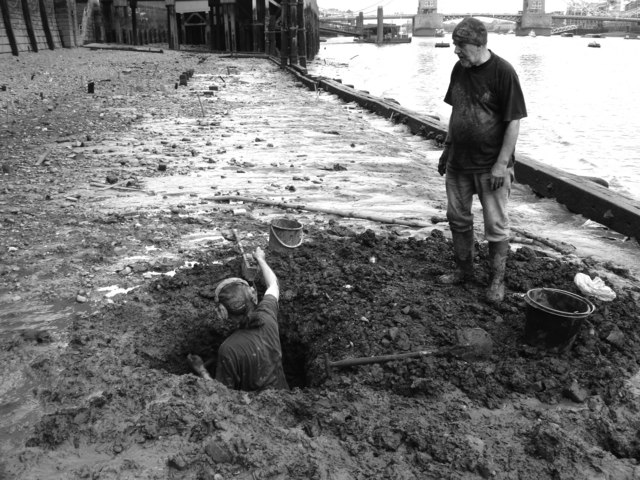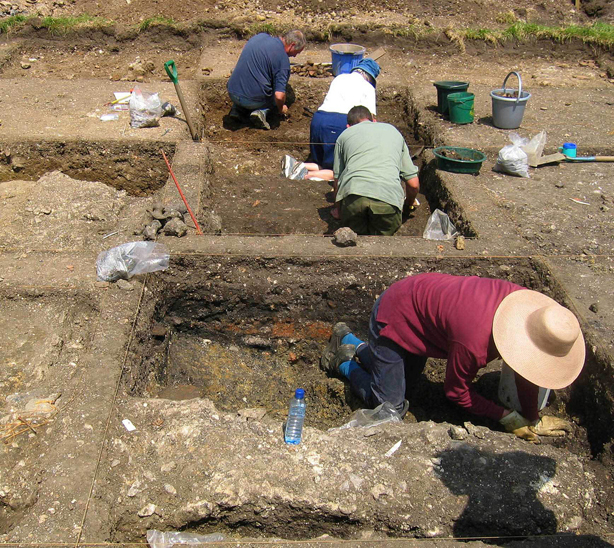Can we really distinguish between treasure hunters and volunteer archaeologists?
- Published: Tuesday, 14 February 2017 10:06
- Hits: 7236
In response to controversies which have been rocking the field of archaeology for several years, ArkéoTopia was asked to contribute to the debate in the review Internet Archaeology with "Can we really differentiate between treasure hunters and non-professional archaeologists?" (Dr. Gransard-Desmond).
 Destruction of a site on the banks of the Thames. Ignorance or voluntary looting for resale on the art market?
© Jarzyn - CC BY-SA 2.0 |
|
 Volunteer archaeologists also know how to dig while respecting contextual clues if they have been given training © Portable Antiquities Scheme, 2007 |
Context
The conference Portable Antiquities: Archaeology, Collecting and Metal Detecting, organised by the Council for British Archaeology (CBA) and the International Centre for Cultural and Heritage Studies (ICCHS), took place on the 13th and 14th March 2010 at Newcastle University and the Great North Museum (Hancock). Although ArkéoTopia was not there, following the presentation of its communication "Ethics and archaeology, between regulations and moral obligation" at the European Association of Archaeologists Dr. Gransard-Desmond was called upon to contribute an article about French archaeology to accompany the publication of the collected papers of the conference.
Summary of the article
Since February 2010, the issue of Users of Metal Detectors (UMDs) has been a hot topic in France. If the issue unleashed passions, although this has not really been reflected in the French media, a question is implicitly linked to the subject: apart fro preventing the very real danger of new archaeological sites being destroyed, will this spell the end of volunteer archaeology [1] ?
With the creation of the National Archaeological Excavations Association (INRAP) in 1973, which became a public service called the National Institute for Preventative Archaeological Research in 2002, coupled with the growth of private companies in archaeology, the professionalisation of French archaeology has significantly changed the relationship between this profession and amateur archaeologists.
This evolution now underlines the ambiguous position of the French state, which, on the one hand, supports the contributions of civil society to the profession, yet on the other hand, is still very suspicious about organisations that are not directly dependent upon the state.
After a quick review of relevant legislation and the evolution of French archaeology, we will present a profile of the UMDs, their impact on archaeology and the reactions to this subject by professionals as well as the state, communities and citizens. Then, we will broaden the issue by asking if UMDs represent the only human danger for archaeology. Finally, we will discuss potential solutions to the problem of looting [2] while still encouraging the involvement and recognition of amateur archaeologists and citizens committed to the protection of French heritage..
Key words
France, heritage, law, metal detectors, looting, MDU, volunteer archaeology, community archaeology, epistemology, history of archaeology
To reference the article: J.-O. Gransard-Desmond 2013 'Can we really differentiate between treasure hunters and non-professional archaeologists?', Internet Archaeology 33. http://dx.doi.org/10.11141/ia.33.2
To find out more...![]() about the publication of the conference Portable Antiquities: Archaeology, Collecting and Metal Detecting on the website of Trafficking culture
about the publication of the conference Portable Antiquities: Archaeology, Collecting and Metal Detecting on the website of Trafficking culture![]() about resources (abstracts, ppt, etc.) published following the conference on the CBA's site
about resources (abstracts, ppt, etc.) published following the conference on the CBA's site![]() about ArkéoTopia, consult the presentation of our non-profit organisaiton and feel free to write to us at contact@arkeotopia.org
about ArkéoTopia, consult the presentation of our non-profit organisaiton and feel free to write to us at contact@arkeotopia.org
1. Volunteer archaeologists, like professional archaeologists, are qualified (with qualificaitons and/or on-site experience) or not and intervene within the framework of an archaeological study (digs, analysis of materiel, data synthesis, experimentation, etc.). In contrast with professional archaeologists, they are not paid for activity undertaken.
2. Looters or treasure hunters are people who look for archaeological remains illegaly without any interest in archaeological research (that is to say as a minimum no publication of results following a scientific approach will see the light of day). The case of family treasures and personal losses merits individual treatment.






